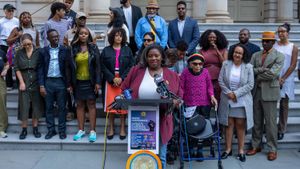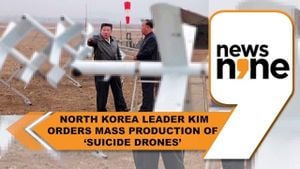Argentina shocked the international community on Thursday by voting against a United Nations resolution condemning violence against women and girls. This resolution, which was largely seen as uncontroversial, received overwhelming support worldwide, yet Argentina alone cast its vote against it, signaling a surprising shift for the country known for its socially progressive history.
The resolution, backed by numerous nations including France and the Netherlands, aimed to call attention to the pervasive violence faced by women and girls, particularly highlighting the dangers they face both online and offline. While countries like Iran, Russia, and North Korea abstained from voting, Argentina's outright rejection of this measure marks its divergence from the global norm.
President Javier Milei, who took office less than a year ago, has drawn significant criticism for this maneuver, seen as part of his radical foreign policy changes. Describing his stance as part of his libertarian beliefs, Milei's administration appears to prioritize individual freedoms over commitments to international agreements. "By fighting imaginary cultural battles, we end up isolated from the world," said Senator Martín Lousteau, expressing the outrage felt across the political spectrum.
Milei's administration's approach is prompting fears of Argentina's international isolation. Not long ago, the country drew eyebrows when it became the only Group of 20 nation to oppose language on gender equality during discussions. Political commentators are alarmed at what appears to be a strategic pivot away from previously liberal foreign policy, with some lawmakers labeling the U.N. vote as "a disgrace".
Defenders of Milei argue the resolution is inherently flawed, with Nahuel Sotelo, the Secretary of Religion and Civilization, declaring it had “a radical feminist approach” lacking sufficient scientific backing. He asserts the proposal sought to limit freedom of expression, reflecting the increasingly conservative elements within Argentina's political system since Milei's election.
The fallout from this vote is likely to extend beyond mere diplomatic embarrassment. Critics point out it threatens to undermine Argentina’s hard-fought gains in social policy, including the longstanding legalization of abortion and recent legislative efforts aimed at combating gender violence. The previous government had enacted significant reforms aimed at protecting women's rights, making this abrupt reversal particularly jarring.
This latest controversy follows other eye-raising actions by Milei, such as abruptly withdrawing Argentina's representatives from the international climate summit and making declarations dismissing climate change as "a socialist lie". Such positions have led to accusations of cultural warfare and have strained Argentina’s relationships with traditional allies, evidenced by the immediate backlash over this voting position at the U.N.
International observers are closely monitoring these developments, as Milei is seen attempting to reshape statements of Argentina's place on the world stage. Multiple diplomatic sources have indicated at least seven senior diplomats have resigned due to disagreements with the government’s new direction. The fallout is being felt within domestic politics as well, with many fearing the potential loss of decades of social progress.
Milei’s foreign policy moves have also led to heightened tensions with other countries, particularly Brazil and Spain. The backlash stems not just from the U.N. vote but also from his administration's intensified support for divisive political rhetoric and alliances, especially with far-right figures abroad. These dynamics are raising eyebrows about the prospects of regional collaboration on issues like gender rights and climate change.
Locally, politicians are voicing dismay as Milei’s administration dismantles key governmental bodies dedicated to promoting equality and protections against violence. The dissolution of Argentina’s ministries for women and the environment speaks volumes about the administration’s new ideological direction, highlighting the sweeping changes undertaken since his rise to power.
Argentina’s left-leaning Peronist movement, long dominant in the South American country, is responding with increasing frustration as what they perceive as severe rollbacks of social policy. Lawmakers from this faction have vocally questioned how much worse the consequences of “fighting imaginary cultural battles” can become for their society.
Prominent Peronist politician Mayra Mendoza articulated significant concern about the meaning of freedom under Milei’s regime, stating emphatically, “For you, freedom is violence.” This sentiment encapsulates the fear among many of losing hard-won social rights within Argentina due to Milei’s extreme positions.
Despite the backlash, Milei continues to forge alliances with powerful political figures, including U.S. President Donald Trump. A recent informal meeting at Trump’s Mar-a-Lago estate underscored their alignment on issues like foreign policy, anti-socialism rhetoric, and deregulatory frameworks. Such relationships reinforce suspicions about Argentina’s future direction on both economic and human rights fronts.
Analysts speculate this growing partnership may not only solidify the Milei administration’s stance against multilateral treaties but might also aid Argentina in securing financial support from the International Monetary Fund, to which it owes over $44 billion. The U.S. is the fund’s largest shareholder, making such diplomatic ties potentially beneficial yet troubling for those prioritizing human rights concerns.
Political experts continue to debate what this all means for Argentina's status as it navigates its fresh identity under Milei’s administration. The administration’s unorthodox actions are placing Argentina onto paths rarely traveled by nations previously committed to social equity and international cooperation.
Argentina now finds itself at a crossroads, deciding whether it will continue to lean toward rightward swings under Milei or march back to the left—a choice laden with global repercussions. Domestic stakeholders continue to chant for dialogue, hoping the president might one day reverse course, recognizing the value of cultural diplomacy and cooperation amid rising global challenges.
The vote against the U.N. resolution is just one of many indicators signaling broader changes underway, marking King Javier Milei's engaging yet troubling impact on Argentina's legacy. Observers will be waiting closely for his next moves, with eyes on whether he can forge alliances abroad without sacrificing the fundamental rights of his citizens at home.



